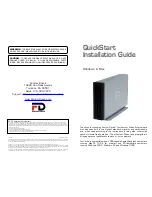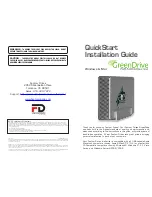
Glossary
Maxtor MaXLine II 250/300GB
G-9
TRACK DENSITY
– How closely the
tracks are packed on a disk surface.
The number is specified as tracks per
inch (TPI).
TRACK TO TRACK SEEK TIME
– The
time required for the read/write heads
to move to an adjacent track.
TRANSFER RATE
– The rate at which
the disk sends and receives data from
the controller. Drive specifications
usually reference a high number that is
the burst mode rate for transferring
data across the interface from the disk
buffer to system RAM. Sustained data
transfer is at a much lower rate
because of system processing
overhead, head switches, and seeks.
U
Ultra DMA
– (UDMA, or, more
accurately, Ultra DMA/133) is a
protocol for transferring data between
a hard disk drive through the
computer's data paths (or bus) to the
computer's random access memory
(RAM). The Ultra DMA/133 protocol
transfers data in burst mode at a rate of
133 MBps (megabytes per second),
twice as fast as the previous Direct
Memory Access (DMA) interface.
UNFORMATTED CAPACITY
– The
total number of bytes of data that
could be fit onto a disk. Formatting the
disk requires some of this space to
record location, boundary definitions,
and timing information. After
formatting, user data can be stored on
the remaining disk space, known as
formatted capacity. The size of a
Maxtor drive is expressed in formatted
capacity.
V
VOICE COIL
– A type of motor used to
move the disk read/write head in and
out to the right track. Voice-coil
actuators work like loudspeakers with
the force of a magnetic coil causing a
proportionate movement of the head.
Maxtor's actuator uses voice-coil
technology, and thereby eliminates the
high stress wearing parts found on
stepper motor type actuators.
W
WEDGE SERVO
– The position on
every track that contains data used by
the closed loop positioning control.
This information is used to fine tune
the position of the read/write heads
exactly over the track center.
WINCHESTER DISKS
– Hard disks that
use a technology similar to an IBM
model using Winchester as the code
name. These disks use read/write
heads that ride just above the magnetic
surface, held up by the air flow created
by the turning disk. When the disk
stops turning, the heads land on the
surface, which has a specially
lubricated coating. Winchester disks
must be sealed and have a filtration
system since ordinary dust particles are
large enough to catch between the
head and the disk.
WRITE ONCE
– In the context of
optical disks, technologies that allow
the drive to store data on a disk and
read it back, but not to erase it.

































